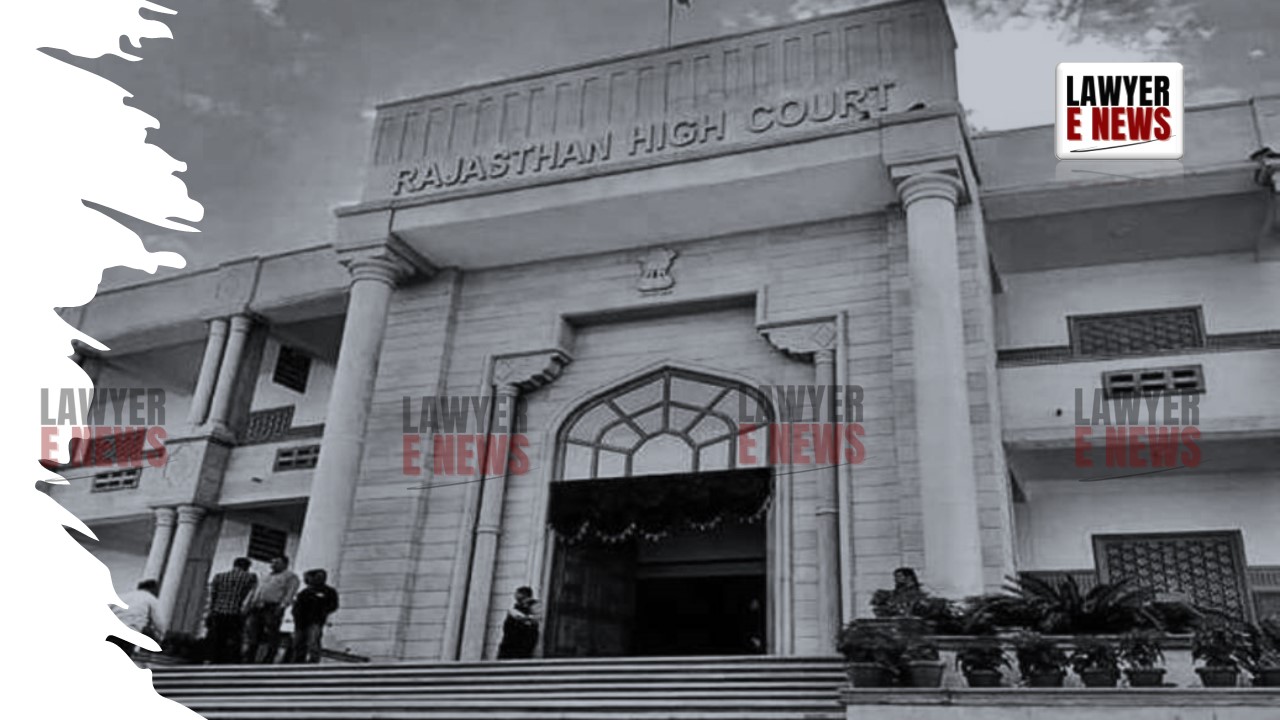-
by Admin
18 February 2026 2:25 PM



Reassessment Based on Tangible Material and Prima Facie Belief of Escaped Income Is Legally Sustainable, Rajasthan High Court at Jaipur in the case of M/s Samay Irrigation Private Limited v. Union of India & Ors. delivered a critical verdict upholding reassessment proceedings initiated under Section 148 of the Income Tax Act, 1961. The Division Bench comprising Justice Avneesh Jhingan and Justice Maneesh Sharma dismissed two connected writ petitions filed by the assessee and emphasized that writ jurisdiction cannot be invoked to interfere with proceedings which are at a nascent stage and founded upon tangible information pointing to escapement of income.
“Assessment had been finalized, but information from DGIT Mumbai led to reopening for escaped income via accommodation entries”
The petitioner, M/s Samay Irrigation Pvt. Ltd., had filed a return for Assessment Year 2012-13, declaring ‘nil’ income. The assessment was completed under Section 143(3) on 30 March 2014. Later, the assessee filed a revised return to correct a depreciation claim, but these proceedings were dropped on 19 March 2015, as the assessment had already been concluded.
Subsequently, based on a letter dated 3 July 2014 from the Director General of Income Tax (Investigation), Mumbai, alleging that the assessee had taken accommodation entries amounting to ₹95,00,000/- from shell companies controlled by Praveen Kumar Jain, the AO issued notice under Section 148 on 29 March 2019.
When objections to the reopening were rejected by an order dated 19 October 2019, the assessee filed CWP No. 20943/2019. A second writ petition (CWP No. 21086/2019) was filed to challenge the reassessment order passed on 11 November 2019.
Court’s Analysis on Legal Issues: “Tangible material existed — sufficiency or correctness of that material is not a matter for writ jurisdiction”
The assessee argued that reassessment was barred by limitation, as four years had passed since the assessment year and there was no failure on its part to disclose material facts fully and truly. It was further contended that the reopening was based solely on third-party information from the DGIT and lacked application of mind.
Rejecting these submissions, the Court held: “There is a tangible material available with the AO to make basis for having reasons to believe that there is escaped assessment. The AO is not required to finally conclude on the relevancy of the material and to hold that it is sufficient and ultimately would result in making an addition.”
The Court pointed out that a preliminary enquiry was conducted before issuing notice under Section 148, including issuance of summons under Section 133(6), which revealed that the transaction pertained to AY 2012-13. The AO was thus justified in forming a prima facie belief of escapement of income.
On Procedural Fairness: “AO dealt with the objections in detail — allegations of mechanical reopening are misconceived”
The assessee claimed that it had provided confirmation from shareholders during the original assessment. The Court refuted this claim: “The petitioner had not furnished confirmation from the shareholders in the ongoing assessment. Neither from the assessment order nor from record it is forthcoming that veracity and financial capacity of entities making payment to the petitioner was gone into during the assessment proceedings.”
Asserting the principle laid down in GKN Driveshafts (India) Ltd. v. ITO (2003) 259 ITR 19, the Court affirmed that the AO had supplied reasons and passed a speaking order rejecting the objections.
On Limitation and Full Disclosure: “Time-barred challenge turns on mixed questions of fact and law”
The assessee claimed that the reassessment was barred by limitation. The Court held that this would depend on whether there was true and full disclosure of facts — a matter requiring factual investigation: “The challenge to notice being time barred will depend upon answer to a mixed question of law and fact as to whether there was true and full disclosure of the material facts by the petitioner.”
On Maintainability of Writ: “Writ not maintainable when statutory remedy has already been availed”
The petitioner had simultaneously filed an appeal against the reassessment order. The High Court strongly disapproved this parallel invocation of writ jurisdiction: “The petitioner cannot be allowed to avail two parallel remedies simultaneously.”
Relying on the Supreme Court’s decision in Chhabil Das Agarwal (2014) 1 SCC 603, the Court emphasized that: “As the Income Tax Act, 1961 provides complete machinery for assessment/reassessment of tax, assessee is not permitted to abandon that machinery and invoke jurisdiction of High Court under Article 226.”
The Court cited precedents such as Gulmuhar Silk Pvt. Ltd. v. ITO (2022) 326 CTR 244, and Sumit Passi v. ACIT (2016) 386 ITR 46, to reinforce the principle that factual disputes arising in reassessment proceedings are best left to the statutory forums.
“No case is made out for interference — petitioner is free to raise all issues before appellate authority”
Having found that there was prima facie material for reopening and noting the availability and invocation of appellate remedy, the Rajasthan High Court dismissed both writ petitions: “The writ petitions are dismissed. The petitioner shall be at liberty to pursue the appeal and raise all issues before the appellate authority.”
Date of Decision: 17 April 2025
